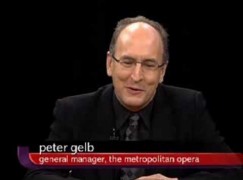Peter Gelb ‘had three hip replacements’
mainBloomberg’s Manuela Hoelterhoff, in classically combative style, comes down on Peter Gelb’s side in the forthcoming showdown with Met unions, who – she says – get an easy ride and more vacation than she does. She has a point, but it’s not as clear as she thinks.
Before pitching into the interview, Manuela mentions that Gelb plays tennis at 60, despite having had three hip replacements.
Let’s assume the insurance paid for those operations. Every time he went under the knife, Gelb benefitted from past agreements that he signed freely and consesually. Next time he needs a new hip, it might not go so smoothly. The insurers may say ‘Hey, Mr Gelb, we see you’ve been hitting the tennis court pretty hard and wore out or new hips too soon. We want a new agreement at lower cost before we let you walk again.’
That’s not a million miles from what Gelb is saying at this moment to the musicians, choristers and backstage staff at the Met. You had an agreement, it costs too much, I want it cheaper next time.
The unions don’t like it – and Gelb doesn’t seem to understand why.
Read the interview with Manuela here.






I suggest Mr. Gelb should consider more carefully what he says and look back on comments made earlier in his tenure before making stupid errors and non-sequiturs like some contained in this interview.
He ever-so-conveniently forgets that when taking over he told Opera News about his “ambitious effort to recruit new audiences to the company and the art form in general, as well as exhibiting the company’s intention to entice some of the most sought-after talent of the music and theater worlds onto the Met’s stage.” It was his intention, the article continued, that through his new initiatives “our theater will thrive, our box office will be restored, and the prospects for opera will improve.”
No mention of bad tidings there! But now in the Bloomberg article, he tells the world, “I once had ambitions to change things, but the recession made it essential to focus limited resources on the product.” He adds, “The audience is shrinking. I fault our times and short-form entertainment. The days of Pavarotti standing center stage and selling out are gone. Then opera still had a foothold in popular culture. It’s a niche now.”
Sorry, Mr. Gelb, Pavarotti last appeared on your stage before you took over. Can you seriously mean opera has become a “niche” in just the seven years of your reign?
The fact is costs have risen by 50% since Gelb took over. Since he presumably signed off on the budgets, he is well aware how much more he has been spending during one of the worst recessions ever. And the idea that he has only just realised the future of the Met itself is under threat because he can no longer up his income is surely risible. The indicators must have been there for years.
In a 2007 interview with Grantmakers in the Arts (somewhat ironically headed “Peter Gelb: Anatomy of a Leader”), readers were told that during his Union negotiations in 2006, Gelb “came on strong, with a vision for how we could change opera for the better.” Clearly not strong enough to implement more of the cuts then he now sees as vital to the Met’s future.
I recall reading in one article that Gelb has a large TV monitor on his office wall so he can always be clued in on what is going on on stage. I suggest he turns the camera out on to Broadway so he can look out at the public passing by without a glance at his organization and spend a lot more time working out how he can get more of them to purchase his tickets.
When I saw the headline, my immediate reaction was he must have three legs.
He’s “not challenging that … they *aren’t* the best”?
Yes, you’re right. That is exactly what happened to NYCO, in Minnesota, in San Diego. It was all about the unions. ……Oh….. wait……..
This is not exactly on the subject of Peter Gelb’s medical history, but I would like to direct your attention to an open letter addressed to Mr. Gelb, entitled “Anti-Israel Opera To Be Viewed By Hundreds Of Thousands” and published a few days ago by algemeiner.com . There are a couple of unfortunate misspellings in that letter but I think that it may be of interest to many SD readers.
I cannot answer the question about the Glyndebourne Festival today, but I do know that in the 1970s it was a non-union House, unlike all other major UK companies. It was also well-known that soloists sang there for lower fees and longer rehearsal periods than elsewhere.
Glyndebourne also sells a higher percentage of its available tickets than the Met – 96% in 2012 (can’t find figures for 2013). It also makes income outside of the opera performances, earning around $340,000 in 2012 from surplus electricity generated by a wind turbine installed in its extensive grounds. But a comparison between a short Festival operation like Glyndebourne and a full season major city House like the Met is hardly comparing like with like.
On the general issue of unions, I sit very much on the fence – they have their good and bad points. But the buck will always stop with managements and Boards. If managers agree to pay rises and improved conditions, then they have to have some level of guarantee of the finances to pay for them. If the finances are imaginary as seems to be the case with the Met’s last few sets of negotiations – the more so in a time of massive recession, then point the finger firmly at the managers, not the unions.